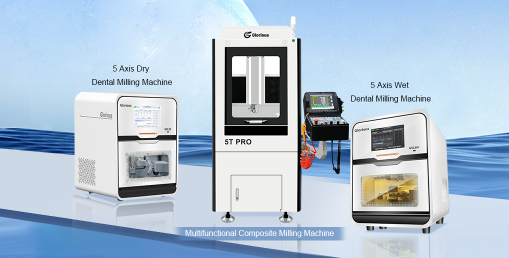In the realm of modern dentistry, the dental milling machine has emerged as a revolutionary tool, transforming the way dental restorations are created. These sophisticated devices are at the forefront of technological advancements in the dental field, offering precision, efficiency, and enhanced patient care.
The dental milling machine is a highly specialized piece of equipment designed to fabricate dental prosthetics such as crowns, bridges, and veneers. It operates by using computer-aided design (CAD) and computer-aided manufacturing (CAM) technology. Dentists or dental technicians input the patient's dental data into the CAD software, which then creates a digital model of the required restoration. This digital model is sent to the milling machine, which precisely carves the restoration from a block of material.

One of the key advantages of dental milling machines is their precision. These machines can create restorations with extremely accurate dimensions and contours, ensuring a perfect fit in the patient's mouth. This not only enhances the aesthetic appearance of the restoration but also improves its functionality and durability. The precision of dental milling machines also reduces the need for adjustments and remakes, saving time and resources for both the dentist and the patient.
Efficiency is another major benefit of dental milling machines. In the past, dental restorations were often made by sending impressions to a dental laboratory, where they would be manually crafted by technicians. This process could take several days or even weeks. With dental milling machines, however, restorations can be fabricated in a matter of hours, sometimes even minutes. This allows for same-day dentistry, reducing patient discomfort and inconvenience.
Dental milling machines also offer a wide range of materials to choose from. These include ceramics, metals, and composites, each with its own unique properties and advantages. Ceramics, for example, are known for their excellent aesthetic qualities and biocompatibility, while metals are often used for their strength and durability. The ability to select the most appropriate material for each patient's needs ensures optimal results.
In addition to fabricating restorations, dental milling machines can also be used for other applications such as implant abutments and surgical guides. Implant abutments are custom-made connectors that attach implants to crowns or bridges. Surgical guides are used to assist in dental implant placement, ensuring accurate positioning and angulation. The use of dental milling machines for these applications further enhances the precision and success rate of dental procedures.
The technology behind dental milling machines continues to evolve and improve. New features and capabilities are being added regularly, making these devices even more powerful and versatile. For example, some dental milling machines now offer 5-axis milling, which allows for more complex geometries and greater precision. Others are equipped with advanced scanning technology that can capture detailed images of the patient's teeth and soft tissues, providing even more accurate digital models.
Despite their many advantages, dental milling machines do have some limitations. One of the main challenges is the cost of the equipment and the materials. Dental milling machines can be expensive to purchase and maintain, and the materials used for fabricating restorations can also be costly. This may limit their accessibility for some dental practices. Additionally, dental technicians and dentists need to be trained in the use of CAD/CAM technology, which can require time and resources.
In conclusion, dental milling machines have revolutionized the field of dentistry by providing precision, efficiency, and a wide range of options for creating dental restorations. While they do have some limitations, the benefits they offer far outweigh the challenges. As technology continues to advance, we can expect dental milling machines to become even more sophisticated and accessible, further enhancing the quality of dental care for patients around the world.